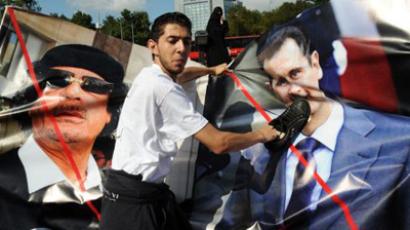Crude ban for Syria
The EU imposes an oil embargo on Syria, freezing almost all business between Damascus and the EU, Syria's main trading partner. Russia however has harshly criticized the move.
A statement made on Friday said the ban covers purchase, import and transport of oil and other petroleum products from Syria amid continuing violence in the country. The EU also prohibited financial or insurance services involved in such transactions. The embargo will take effect immediately as details of the sanctions are published in the official EU newspaper.Russian Foreign Minister Sergey Lavrov has condemned sanctions imposed on Syria by the European Union, including a proposed oil embargo."We have always said that no good will come out of unilateral sanctions. This destroys a partner-like approach toward any crisis," Lavrov said on Saturday. "We are against unilateral sanctions.”The decision will halt more than US $4.2 billion a year in Syrian crude oil and petroleum products being exported to Europe. The decision was made during a non-formal meeting of MFA heads of 27 EU countries that took place in the Polish city of Sopot. The embargo was earlier approved by heads of the Permanent Mission of the EU countries in Brussels."This is trying to hit the oil that's a critical financial lifeline to the regime," an EU official was quoted as saying.Four more Syrian individuals and three entities were added to the list of those targeted by an EU asset freeze and travel ban.On August 24, an EU decision on sanctions aimed at 15 Syrian officials and five companies came into effect. Their active assets were frozen and they were banned from entering the EU. Hillary Clinton, the US Secretary of State, added her voice to growing calls for UN Security Council sanctions against Assad, measures currently blocked by Russia and China.“The violence must stop and he needs to step aside,” she said to The Daily Telegraph.
The director of the Center for Research on Globalization, Michel Chossudovsky, says that the new round of sanctions is just another step toward a NATO-led military intervention in Syria. “It is a part of a road map which eventually is intended to lead into some kind of military intervention,” Chossudovsky claimed. “I think what is happening now is the sanctions stage of something which has been planned… which according to many analysts is a military intervention in Syria – which in essence would engulf the whole region.”
Meanwhile, activists say at least 14 people have been killed in fresh mass protests after weekly Muslim prayers on Friday. The Syrian Observatory for Human Rights said eight of the deaths occurred when security forces moved to break up protests in several suburbs of Damascus. However, the official SANA news agency reported that confrontations between security forces and “armed terrorist groups” had left three officers and four gunmen dead.The UN says that more than 2,200 people have been killed since the near-daily protests against Assad’s regime began to sweep the country in mid-March.














